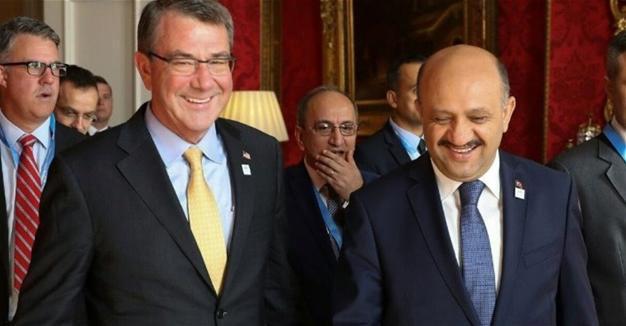US defense secretary thanks Turkey for its contribution to fight against ISIL
WASHINGTON
 The United States defense secretary Ashton Carter has thanked his Turkish counterpart Fikri Işık for Turkey’s contribution to the U.S.-led campaign against the Islamic State of Iraq and the Levant (ISIL).
The United States defense secretary Ashton Carter has thanked his Turkish counterpart Fikri Işık for Turkey’s contribution to the U.S.-led campaign against the Islamic State of Iraq and the Levant (ISIL). “[Carter] thanked Minister Işık for his participation in the ministerial and for Turkey’s significant contributions to the counter-ISIL campaign, especially Operation Euphrates Shield and its efforts to close its borders to ISIL,” said a statement issued by the U.S. Department of Defense on Dec. 15, after a meeting between the two ministers, who met on the sidelines of the counter-ISIL Defense Ministerial in London.
The Euphrates Shield Operation was launched in late August in northern Syria to clear Turkey’s border of ISIL and the Syrian Kurdish Democratic Union Party (PYD), which Ankara regards as an offshoot of the outlawed Kurdistan Workers’ Party (PKK).
“Both leaders reaffirmed their unyielding resolve to deal ISIL a lasting defeat, discussing a range of practical cooperative efforts that will accelerate the fight,” the statement added.
Carter also “strongly condemned the Dec. 10 [Istanbul] attack on Turkish police and citizens,” and vowed the U.S. would continue to stand with Turkey to combat the PKK, ISIL and terrorism in all its forms.
Işık also met U.K. defense secretary Michael Fallon in London.
According to Turkish ministry sources, Işık highlighted in the meeting that Turkey’s fight against the PKK would continue. He thanked members for their condolences on the recent terrorist attack in Istanbul but emphasized that they should give attention to Turkish sensitivities during operations in Syria and Iraq.
Işık also reportedly said to Carter and Fallon that the long-term success against ISIL’s ideology depended on how Western communities combatted rising Islamophobia.
Billed as an attempt to deepen cooperation among anti-ISIL forces, the summit concentrated on developments in Iraq’s Mosul and Syria’s Raqqa.
A statement from the U.K. government said British warplanes had destroyed ISIL positions around Mosul as Iraqi government forces continued to advance to the east of the city. The U.K. government said it had contributed to efforts in opening a second front in Raqqa, which is ISIL’s de facto capital.
Earlier, Fallon said the U.K. was playing a leading role in the fight against ISIL.
“In 2017, we must maintain momentum to deal these terrorists a decisive blow,” he added.
“In addition to putting ISIL on the path to a lasting defeat, we’ll need to continue to counter not only the foreign fighters trying to escape ISIL, but also ISIL’s attempts to relocate or to reinvent itself,” Carter added to Fallon’s statement.
‘No future for Assad’
Fallon stressed that the U.K. sees “no political future” for Syrian President Bashar al-Assad.
“There is no victory in bombing hospitals and restricting humanitarian aid and ending up in a country you only control 40 percent of and is half destroyed with millions dispersed and hundreds of thousands killed. That is no victory. We don’t see a future for Syria with President al-Assad. On the contrary, we continue to work for a political settlement in Syria that is genuinely pluralist that can involve all sectors of Syrian society, but not al-Assad himself,” he said at a joint news conference with Carter after the meeting.
















